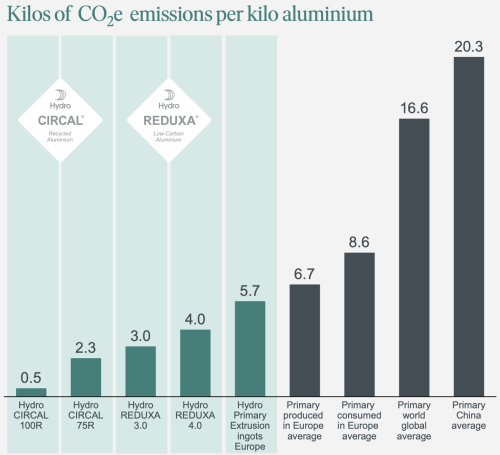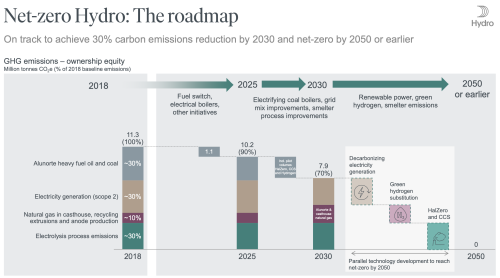Mercedes-Benz will collaborate with Norwegian aluminum producer Hydro to reduce significantly the CO₂ footprint of aluminum in the automotive supply chain. Hydro and Mercedes-Benz will from 2023 to 2030 collaborate on a joint technology roadmap aiming to develop aluminium solutions approved for automotive applications with a CO2 footprint below 3.0 kgCO2/kgAl. The ambition is to approach near-zero aluminum by end of the same time period.
Hydro will deliver its first volumes of aluminum with a carbon footprint below 3.0 kgCO2e/kgAl—Hydro REDUXA 3.0—to Mercedes-Benz in 2023. The product will be introduced to a range of Mercedes-Benz models including the electric EQ models.
Hydro is working on two specific low-carbon lines: REDUXA (primary production) and CIRCAL (recycled aluminum). Hydro is currently delivering REDUXA 4.0—aluminum with a maximum 4.0 kg CO2 per kgAl (including all process steps). Source: Hydro.
Hydro already supplies Mercedes-Benz with CO₂-reduced aluminum for its foundry in Stuttgart Mettingen. The strategic partnership raises the cooperation to a new level to optimize decarbonization processes for aluminum used in vehicle manufacturing.
Mercedes-Benz and Hydro are not only looking into further reduction of emissions but also aim to reduce the use of primary resources through increased use of secondary materials from post-consumer scrap.
Together with steel, aluminum is proportionally the most widely used material in many vehicles. Therefore, this agreement marks a step for the supply of low emission aluminum and thereby reducing the carbon footprint of Mercedes-Benz products.
For realizing the path towards near zero CO₂ aluminum it is important to optimize both the primary aluminum production process, starting with CO₂-optimized aluminum oxide production, as well as reducing the CO₂ emissions resulting from the electrolysis process.
At the same time, next to technological improvements, increasing the use of recycling material plays a major role for realizing further CO₂ reductions. Producing aluminum by using secondary material only requires 5% of the energy compared to aluminum production based on primary resources. As part of the collaboration Mercedes-Benz and Hydro even want to take it one step further by exploring solutions how to implement a closed-loop-recycling.
Hydro is well positioned to be a low-carbon producer, as 70% of the electricity used in Hydro’s primary production is based on renewable power.


